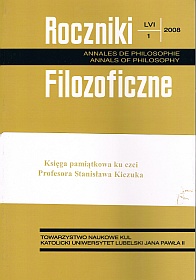Relativistic Revolution and Ontology of Physics
Abstract
In the course of the development of physics until the beginning of the twentieth century there was an evolutionary progress within its ontological frameworks. Its continuity was violated by A. Einstein’s works of 1905 and his so-called „quantum and relativistic revolution.” In its course people gave up a series of results they had achieved, and replaced them by some radical solutions that differed from common sense intuitions. In particular, in the context of the theory of relativity the concept of electromagnetic ether was rejected. Then the concept of absolute time and absolute geometry of space were removed, facts that eliminated the „flow” of time and change of the ontology of physics from the substantialist one into the eventist one. The changes turned out unnecessary, they resulted not from the very theory of relativity, but from some arbitrary solutions within the frameworks of its philosophical interpretation. On the other hand, they clash with clear ontological intuitions and make an explanation of the „flow” of time impossible. What is more, they are also not beneficial for a further progress in the development of physics, especially in the context of seeking a quantum theory of gravitation. It seems right to return to pre-relativistic concepts, starting from ether. For it is the elimination of the latter that had started the „revolution.”
References
Bell J. S.: How to teach special relativity, [w:] tenże, Speakable and Unspeakable in Quantum Mechanics, Cambridge: Cambridge University Press 1987.
Brown H. R., Pooley O.: The origin of the spacetime metric: Bell’s Lorentzian pedagogy and its significance in general relativity, [w:] C. Callender, N. Huggett (eds.), Physics Meets Philosophy at the Planck Scale, Cambridge: Cambridge University Press 2001.
Czerniawski J.: Dwie interpretacje teorii względności, „Zagadnienia Naukoznawstwa” 26 (1990), s. 315-329.
Einstein A.: O elektrodynamice ciał w ruchu, [w:] tenże, 5 prac, które zmieniły oblicze fizyki, Warszawa: Wyd. Uniwersytetu Warszawskiego 2005.
Feynman R. P.: The theory of positrons, „Physical Review” 76 (1949), s. 749-759.
Hajduk Z.: Ontologiczne założenia matematyki, [w:] M. Heller, J. Życiński, A. Michalik (red.), Matematyczność przyrody, Kraków: OBI 1990, s. 93-112.
Hamilton A. J. S., Lisle J. P.: The river model of black holes, preprint gr-qc/0411060, http://arxiv.org, ukaże się w „American Journal of Physics”.
Heller M., Staruszkiewicz A.: Polemika Leibniza z Clarke’iem w świetle współczesnej fizyki, [w:] M. Heller, Wieczność, czas, kosmos, Kraków: ZNAK 1995, s. 41-54.
Kopczyński W., Trautman A.: Czasoprzestrzeń i grawitacja, Warszawa: PWN 1981.
Kostro L.: Alberta Einsteina koncepcja nowego eteru, Gdańsk: Wyd. „Scientia” 1999.
Leibniz G. W.: Polemika z Clarke’iem, [w:] tenże, Wyznanie wiary filozofa, tł. z franc. i ang. S. Cichowicz, Warszawa 1969, s. 319-448.
Placek T.: Is Nature Deterministic?: a Branching Perspective on EPR Phenomena, Kraków: Jagiellonian University Press 2000.
Poincaré H.: Sur la dynamique de l’électron, „Rendiconti del Circolo Matematico di Palermo” 21 (1906), s. 129-175.
Poincaré H.: Miara czasu, [w:] tenże, Wartość nauki, Warszawa: G. Centnerszwer i S-ka 1908, s. 22-36.
Rindler W.: Essentials Relativity, wyd. 2, New York: Springer 1977.
Schutz B. F.: Wstęp do ogólnej teorii względności, tł. z ang. W. Kopczyński, Warszawa 2002.
Snihur S.: Czas i przemijanie, Warszawa: Wyd. SGGW-AR 1990.
Taylor J. G.: Do electroweak interactions imply six extra time dimensions?, „Journal of Physics A: Mathematical and General” 13 (1980), s. 1861-1866.
Trautman A.: Comparison of Newtonian and relativistic theories of space-time, [w:] B. Hoffman (ed.), Perspectives in Geometry and Relativity, Bloomington 1966, s. 413-425.
Visser M., Barceló C., Liberati S.: Analogue models of and for gravity, „General Relativity and Gravitation” 34 (2002), s. 1719-1734.
Życiński J.: Filozoficzne aspekty dematerializacji materii w fizyce współczesnej, [w] Z zagadnień filozofii przyrodoznawstwa i filozofii przyrody, t. 8, Warszawa: ATK 1986, s. 49-74.
Copyright (c) 2008 Roczniki Filozoficzne

This work is licensed under a Creative Commons Attribution-NonCommercial-NoDerivatives 4.0 International License.





